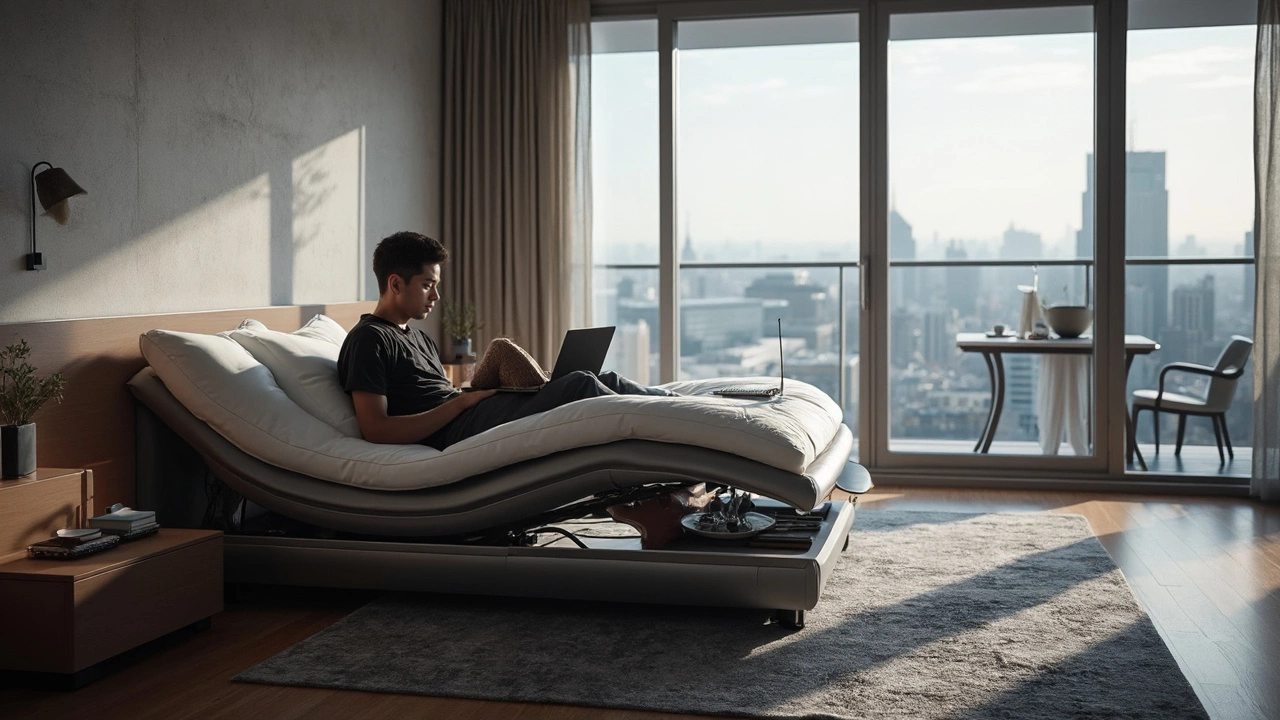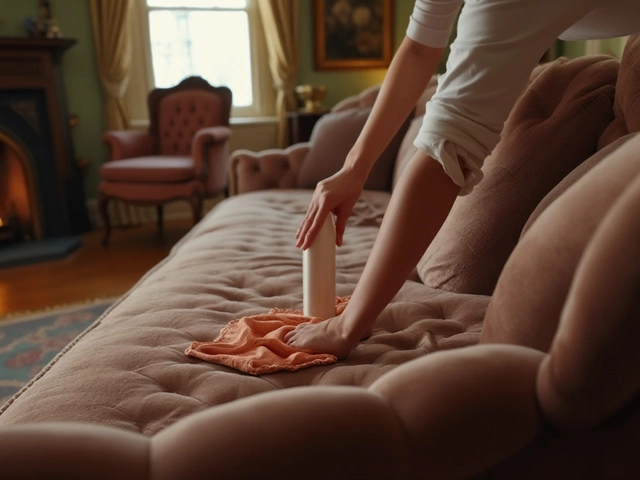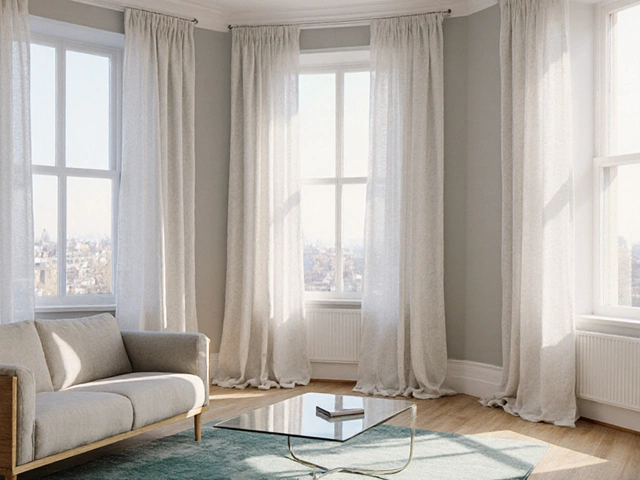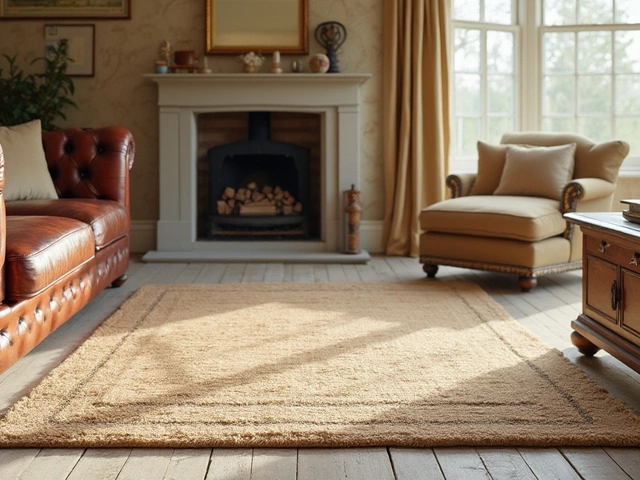Who Should Steer Clear of Adjustable Beds?

Adjustable beds have become quite popular recently, offering the flexibility to change the angle of the mattress for better comfort. But hold on! They're not the go-to choice for everyone. Yes, while they might work wonders for some, others might find them less useful or even uncomfortable.
First off, if you have certain health issues like severe sleep apnea, an adjustable bed might not be your best bet. It can help with mild symptoms, but for severe cases, a Continuous Positive Airway Pressure (CPAP) machine is usually more effective.
Then there's lifestyle to think about. If you're someone who loves a solid, fixed bed that doesn't move around, this might not be your cup of tea. An adjustable bed might feel a bit too techy or even excessive. Plus, they can be pricey. Investing in one without trying it out first could lead to some serious buyer's regret.
- Introduction to Adjustable Beds
- Health Concerns
- Lifestyle Considerations
- Alternative Options
- Final Thoughts
Introduction to Adjustable Beds
Adjustable beds, or what some might fondly call the tech-savvy foundation of modern sleep, have been gaining quite the fanbase. They bring a dose of hotel-like luxury right into your bedroom, with the ability to tilt and elevate at the touch of a button.
What makes them appealing? For one, they help customize your sleep position to reduce pressure points. A simple tilt of the head section or elevation of the feet can relieve back pain and improve overall sleep quality. That's sound science working right under your sheets. Plus, snorers unite—elevating the head can sometimes ease those nighttime noises, much to a partner's relief.
Adjustable beds come fitted with motors that allow for separate adjustments via a remote or smartphone app. Some even come with added features like massage modes, USB ports, and under-bed lighting. Sounds fancy, right? But, with all these gadgets, the price tag tends to climb. They do require a bit of an investment upfront.
Who Would Benefit the Most?
These beds work wonders if you're dealing with specific health conditions like arthritis or acid reflux. They allow you to adjust positions based on how you feel each day. Beyond health, they're a hit with anyone who loves reading, watching TV, or working on a laptop in bed—nobody misses having to prop up a mountain of pillows!
Types and General Costs
You'll find a bunch of different models out there, from basic mechanical versions to super-luxurious smart beds that track your sleep patterns. Prices vary, but expect to start around a thousand bucks and go up from there.
| Feature | Basic Model | Advanced Model |
|---|---|---|
| Operating Mechanism | Manual Adjustment | Remote/Smartphone App |
| Extra Features | Not included | Massage, USB ports, lighting |
| Price Range | $1,000 - $2,500 | $2,500 and up |
All said and done, while these are a dream choice for some, they aren’t necessarily for everyone. It's crucial to weigh up your needs, budget, and lifestyle to see if an adjustable bed is the unsung hero of your sleep needs.
Health Concerns
When it comes to adjustable beds, they're pretty awesome for comfort, but not everyone should jump right into using them. Let's chat about why. Here's a breakdown of some health concerns to keep in mind.
Impact on Severe Sleep Apnea
Many folks think that simply adjusting their bed can help with sleep apnea and, while it might help with mild cases, it's not a replacement for a CPAP machine. For those with severe sleep apnea, relying solely on an adjustable bed might not provide the necessary airway support.
Potential for Aggravating Back Pain
If you're dealing with back pain, especially lower back pain, the adjustability might seem attractive. But, keep this in mind: the wrong position can actually make discomfort worse. It's often recommended that those with spine conditions opt for a flat, firm surface that offers consistent support.
Circulatory Concerns
Folks with circulatory issues need to be cautious as well. For example, keeping the legs elevated for long periods, a common use of these beds, can sometimes compromise blood flow if not adjusted properly.
Elderly or Limited Mobility
Elderly individuals or those with limited mobility might find the mattress adjustments cause more disruptions than conveniences. Getting in and out of bed might become harder if the position isn't right, and frequent position changes can lead to more discomfort rather than relief.
| Condition | Recommendation |
|---|---|
| Severe Sleep Apnea | Use CPAP instead of relying solely on an adjustable bed |
| Back Pain | Consult a specialist to find the right mattress firmness |
| Circulatory Problems | Adjust positions with caution to ensure proper blood flow |
In the end, while adjustable beds can offer a world of comfort, ensuring they're suitable for your unique health needs is key. It's always a good idea to chat with a healthcare provider before making this investment.

Lifestyle Considerations
So, let's chat about lifestyle and how it plays into your choice of bed. First thing's first: how much do you move around in your sleep? If you twist and turn a lot, an adjustable bed might seem like a cool idea, but it can be tricky to adjust the bed every single time you change position. This is especially true if you share the bed with someone else who might want a different setup altogether.
Next up, aesthetics. If you're someone who loves sleek, minimalist furniture, the bulkiness of adjustable beds might not fit your style. They often come with motors and extra components that could disrupt your bedroom's feng shui.
Budget Consideration
Now, let's not ignore the cost factor. Adjustable beds tend to be more expensive than your standard bed. If you're tight on budget, it might be better to invest in a high-quality mattress with good cushions instead.
Functionality Needs
Another aspect to think about is how often you’ll use its features. Are you just intrigued by the tech or do you actually need that bed to incline and recline for any specific reason? If you’re not planning to use those features regularly, it might be overkill.
Finally, consider ease of use. These beds come with remotes and settings that might overwhelm someone who's not tech-savvy. If you're not keen on figuring out another gadget, a traditional bed might be more straightforward.
| Factor | Consideration |
|---|---|
| Movement | Frequent movers may find adjustments cumbersome |
| Aesthetic | May not align with minimalist design preferences |
| Budget | Higher cost compared to standard beds |
| Usage | Features may be unused if not regularly needed |
| Ease of Use | Could be complex for non-tech-savvy individuals |
Alternative Options
If an adjustable bed isn't your style or simply doesn't fit your needs, there's no shortage of alternatives to explore. Customization and comfort can still be achieved in other ways without going high-tech!
Traditional Beds
Starting with the basics, a well-chosen traditional bed can serve you just as well, if not better. Consider something with a firm mattress if back support is crucial. Memory foam or latex mattresses can also provide the contouring options you're after without the need for adjustments.
Quality Cushions and Pillows
Don't overlook the importance of a good set of cushions and pillows. For instance, a wedge pillow can elevate your head enough to help with mild apnea or heartburn, without investing in new furniture. Experiment with different shapes and materials to find what suits your sleeping style.
Adjustable Mattress Toppers
Another budget-friendly way to enhance comfort is by using an adjustable mattress topper. It offers a bit of that malleability to cater to different body shapes and sleeping positions. Plus, it's much easier (and cheaper) to swap out if it doesn't meet expectations.
Sleep Numbers vs. Adjustable Bases
For some, a Sleep Number bed might be the compromise between traditional and adjustable options. They allow for flexibility in firmness without moving the bed's frame around. It’s worth noting that these might not be the perfect match for back sleepers, though, as posture preferences vary.
Statistics and Comparisons
Still deciding if an adjustable bed is worth the hype? Let's take a glance at some comparative stats:
| Option | Average Cost | Adjustability Features |
|---|---|---|
| Traditional Bed | $500-$1500 | No |
| Adjustable Bed | $1500-$3000 | Yes, both head and foot |
| Memory Foam Mattress | $800-$2000 | Contouring only |
| Sleep Number Bed | $1000-$5000 | Adjustable firmness |
Whatever you choose, it's about aligning with your health needs, lifestyle, and budget. With so many choices, there's surely a perfect fit out there for everyone.

Final Thoughts
Choosing the right bed is more than just ticking boxes—it's about what makes sense for you. Sure, adjustable beds have a lot of perks, but they're not a one-size-fits-all solution. Being aware of your specific needs and limitations can really help you make an informed decision.
Health is a biggie. Always chat with your doctor if you're dealing with health problems that might interact with bed choices. Like Dr. Emily Roberts, a sleep specialist, says,
"A bed that adapts to your body's needs can improve sleep quality, but it's not the answer for every condition. It's essential to know what's right for you."
The last thing you want is to splurge on a fancy bed only to find yourself tossing and turning worse than before.
Weighing the Options
Before diving into a purchase, consider what really matters: Do you need the specific features of an adjustable bed? Or would a standard bed with a high-quality cushion fit the bill?
- If you enjoy techy gadgets and customization, an adjustable bed might just scratch that itch.
- For those who prefer simplicity or have a stricter budget, simpler solutions might be more practical and comfortable.
Realistically, the best choice echoes your lifestyle, budget, and sleep health needs. It’s worth investing the time to figure that out.





